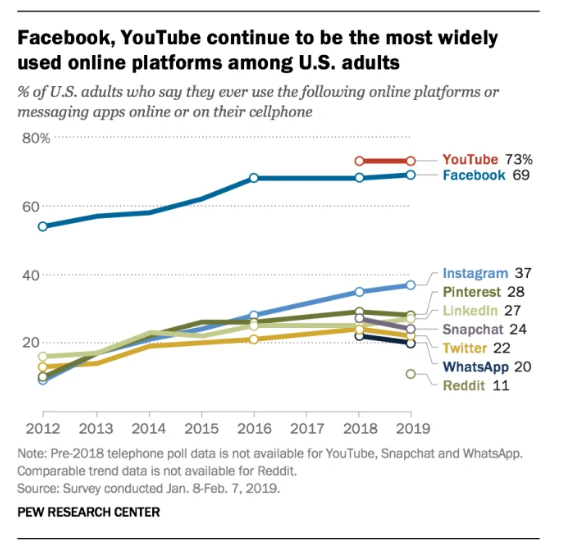Two years ago I made some observations on how weird things were getting in social media land. At the time, brands were just starting coming to terms with misleading video metrics on FB when the whole YouTube scandal hit. This was on top of the Cambridge data analytics fiasco, and right around the same time Twitter was accused of delivering misleading analytics.
Facebook and YouTube continue to be the most widely used platform among U.S. adults, but their formerly rapid rise has clearly plateaued according to the Pew Research Center.

Meanwhile, both Instagram and Facebook have dabbled with changing how “likes” are shown, while engagement for brands heads to the basement.
Is social media marketing dying? Kaya Ismail in CMS Wire takes an analytical look at the situation.
“First, let’s look at some numbers,” Ismail writes. “Buffer’s study of 43 million Facebook posts found that Facebook engagement between 2017 and 2018 dropped dramatically, with the average engagement per image dropping from 9,370 per post in Q1 2017 to just 3,454 per post in Q2 2018, while the average engagement per video fell from 5,486 to 2,867.”

Image source: Buffer
Twitter is facing its own problem, mainly one of mass – with 500 million tweets published daily it has essentially become, in Ismail’s words, a “noise machine.” Business marketing guru Neil Patel went so far as to declare Twitter “dead” for brands looking to drive traffic to their sites.
Some blame the constantly changing algorithms that make it expensive and exhausting to engage on social media. Others point to the ease of entry (“everyone’s doing it”) that makes it nearly impossible to rise above the noise.
“Others, such as Leah Tombling, social media executive at Colewood Internet, lament the issues surrounding privacy and the impact this has had on end-user trust in social media,” Ismail continues. In fact, Team Z recently announced a $40 million dollar settlement in the video metrics suit brought by advertising and marketing agencies on behalf of their clients.
Fake news on top of fake views – it’s no wonder many are walking away or seriously cutting back. Many of us in the industry (self-included) felt that 2017 was a watershed year for social media, as senior marketers began to fully realize the underlying problems with social media – and start viewing print in a new, more important light.
Two years ago we watched as brands came to realize the bitter truths about ad tech and insist on accountability from third-party platforms. They demanded to know where their ad dollars were being spent, to avoid risk to their brand reputations through unsavory associations. We even saw brands stand up to the 99% duopoly and regain control of their distribution destiny.
I’m not suggesting social media doesn’t have a role to play in a solid marketing strategy for many brands. It’s a young industry, and will grow and … hopefully … grow up. Yet it is heartening to see the “all aboard” frenzy that has been social media dying down a bit as we all begin to understand not just the benefits but the downsides.

October 17, 2019, 8:08 am